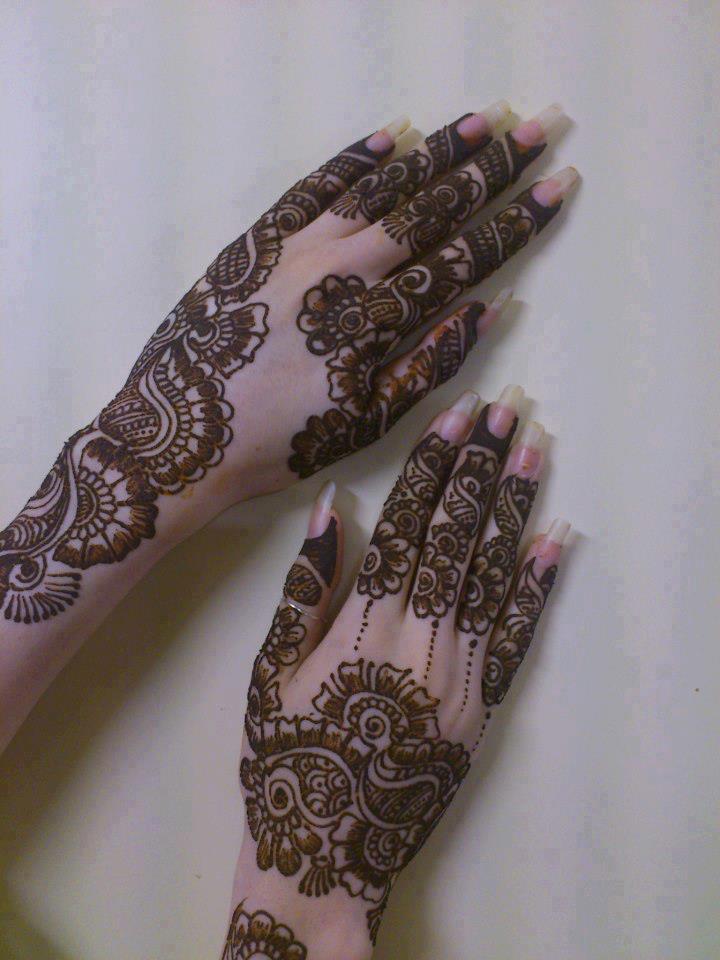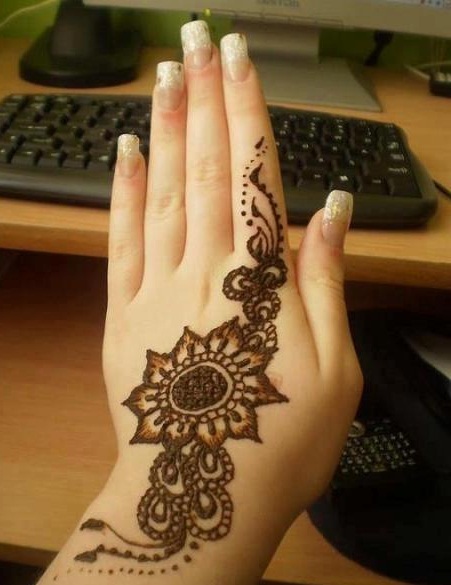Heena Designs 2013 Biography
source(google.com.pk)People have faith in South Asia (especially in India and Pakistan) that a bride cannot look beautiful without heavy embroidered dress, bridal makeup and mehndi design. Decorating hands, arms, feet and even legs has been a custom of this era for decades and even in this modern age girls have strong faith and believe in this tradition. Applying mehndi designs is not only a part of cultural events but girls even put mehndi designs casually. The tradition now has become a fashion. Though as far as the creativity of this art is concern we have number of mehndi designers across the world which are doing work in different domains. Among mehndi designs creativity, bridal mehndi designs are most important. Girls not even like the stuff but consider this an essential part of wedding.
Bridal mehndi designs has become an industry in India and Pakistan which has huge potential of business and due to this prospective people are learning this art day by day. Here we are going to share you some of the Fresh Indian Bridal Mehndi Designs.
The core and sole designer of all these bridal mehndi designs is Sonya Patel. We have already written about Sonya Patel but for the time being we just introduce her for new visitors. Sonya Patel is a young, energetic and creative mehndi designer from India. She is working solely in this field for couple of days. Sonya Patel has marvelous talent in this field and she9 team is working to promote her work at broader spectrum. Today we have brought some bridal mehndi designs for our valued visitors. The collection consists of heavy customized Indian mehndi designs for hand, feet and legs and some of them are Arabic Mehndi Designs. Most of the designs are based on native Indian traditional style of applying the mehndi designs. Floral and leaf styles are being fetched with modern patterns to give a flourish and new look to the designs. Hope you will like all the designs we have there…! To have fresh bridal mehndi designs please keep visiting the she9 blog.
Bridal mehndi designs are the charm of all Indian and Muslim’s weddings. Indian and Muslim marriages are incomplete without the mehndi. The best wedding mehndi designs enhance the mood of the ceremony. Brides are always very excited about the mehndi ceremony where an elaborate mehndi design is made on her hands and feet to adorn them.
Here we have some new Bridal mehndi designs 2012 on our site gallery, we hope you will like these Bridal Mehndi pictures 2012 and also the Beautiful Bridal mehndi designs from many countries. There are also some Bridal Arabic mehndi designs and mehndi designs art for other countries. Keep stay with us for more stylish mehndi designs from all over the world and Give us your feed back for our quality management.
The main Somali dialect which is the most widely used is Common Somali, a term applied to several subdialects, the speakers of which can understand each other easily. Common Somali is spoken in most of Somalia and in adjacent territories (Ogaden, North Eastern Province, and Djibouti), and is used by broadcasting stations in the Somaliland region of Somalia.
Facility with language is highly valued in Somali society; the capability of a suitor, a warrior, or a political or religious leader is judged in part by his verbal adroitness. In such a society, oral poetry becomes an art, and one's ability to compose verse in one or more of its several forms enhances one's status. Speakers in political or religious assemblies and litigants in courts traditionally were expected to use poetry or poetic proverbs. Even everyday talk tended to have a terse, vivid, poetic style, characterized by carefully chosen words, condensed meaning, and alliteration.
In the prerevolutionary era, English became dominant in the school system and in government. However, the overarching issue was the development of a socioeconomic stratum based on mastery of a foreign language. The relatively small proportion of Somalis (less than 10 percent) with a grasp of such a language—preferably English--had access to government positions and the few managerial or technical jobs in modern private enterprises. Such persons became increasingly isolated from their nonliterate Somali-speaking brethren, but because the secondary schools and most government posts were in urban areas the socioeconomic and linguistic distinction was in large part a rural-urban one.
Heena Designs 2013 Patterns Images Book For Hand Dresses For Kids Images Flowers Arabic On Paper Balck And White Simple


Heena Designs 2013 Patterns Images Book For Hand Dresses For Kids Images Flowers Arabic On Paper Balck And White Simple


Heena Designs 2013 Patterns Images Book For Hand Dresses For Kids Images Flowers Arabic On Paper Balck And White Simple


Heena Designs 2013 Patterns Images Book For Hand Dresses For Kids Images Flowers Arabic On Paper Balck And White Simple


Heena Designs 2013 Patterns Images Book For Hand Dresses For Kids Images Flowers Arabic On Paper Balck And White Simple


Heena Designs 2013 Patterns Images Book For Hand Dresses For Kids Images Flowers Arabic On Paper Balck And White Simple


Heena Designs 2013 Patterns Images Book For Hand Dresses For Kids Images Flowers Arabic On Paper Balck And White Simple


Heena Designs 2013 Patterns Images Book For Hand Dresses For Kids Images Flowers Arabic On Paper Balck And White Simple


Heena Designs 2013 Patterns Images Book For Hand Dresses For Kids Images Flowers Arabic On Paper Balck And White Simple


Heena Designs 2013 Patterns Images Book For Hand Dresses For Kids Images Flowers Arabic On Paper Balck And White Simple


No comments:
Post a Comment